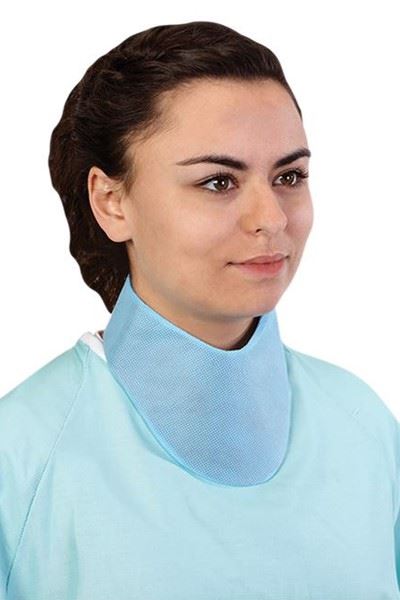-
Home
-
Protecting the Thyroid from Radiation Exposure
Protecting the Thyroid from Radiation Exposure
June 6, 2023

Radiation exposure is a significant concern for medical professionals who frequently work with or around sources of ionizing radiation during medical procedures. As a result, limiting radiation exposure for medical staff should be a top priority.
A number of factors play a critical role in reducing doses of scatter radiation, including the length of time that exposure occurs, the distance from the source of radiation, and shielding from radiation. However, the most critical factor in reducing doses of scatter radiation is proper shielding, which will be discussed in greater detail later in this article.
One of the most vulnerable organs susceptible to the damaging effects of scatter radiation exposure is the thyroid gland, which is the butterfly-shaped endocrine gland normally situated in the lower frontal region of the neck.
The thyroid impacts many of the body’s metabolic processes. It is therefore critical for medical personnel who work in settings where radiation is present to understand the importance of adhering to proper safety and protective protocols so that they can minimize the risk of causing damage to the thyroid.
Many types of medical equipment and procedures involve the use of ionizing radiation. An example of this is C-arm fluoroscopy, which is used to assist with correct needle targeting for accurate drug injection in patients through the use of X-ray images. Use of these types of procedures, hoever, leads to increased exposure of medical personnel to ionizing radiation.
In this article, we will discuss the effects of radiation on the thyroid, why it's essential to protect it, and the various ways to do so effectively for medical professionals who work with radiation.
Can Radiation Damage the Thyroid?
The thyroid gland is responsible for producing hormones that regulate metabolism, growth, and energy levels. Exposure to ionizing radiation without adequate protective gear can cause severe damage to the thyroid gland cells, potentially leading to an increased risk of thyroid cancer or other thyroid-related disorders.
Why Protect Your Thyroid from Radiation?
Although it is important to protect all parts of the body from exposure to radiation, protecting the thyroid is especially vital for several reasons. Firstly, the risk of thyroid cancer is significantly increased following exposure to high levels of ionizing radiation. Additionally, radiation exposure can lead to other thyroid-related disorders, such as hypothyroidism, hyperthyroidism, and thyroiditis.
Medical professionals must take precautions to protect their thyroid glands, especially for those at the highest risk due to a greater frequency of operations involving the use of radiation—such as C-arm fluoroscopy—as well as their proximity to the source of radiation during these procedures.
How to Protect Your Thyroid from Radiation
There are several methods that medical professionals can use to protect their thyroid glands from radiation. Below, we outline a few of the most important steps that can be taken to help ensure effective radiation protection.
- Education and awareness: A thorough understanding of the dangers of radiation exposure and of the appropriate safety measures is crucial for medical personnel to be able to reduce their risk of developing radiation-induced thyroid complications and other side effects.
- Time, distance, and shielding: Adherence to the ALARA principles of limiting the time spent near radiation sources, maintaining distance from the source, and correctly using shielding materials can significantly reduce exposure.
- Protective gear: Wearing appropriate protective equipment such as thyroid shields and thyroid collars during medical procedures where scatter radiation is used can help shield the thyroid from harmful levels of exposure.
Radiation Protection Equipment
Protective gear is essential for limiting radiation exposure for healthcare professionals, and it is especially important to choose equipment that fully protects the thyroid. AliMed offers a variety of thyroid protection products, all of which provide 0.5 mm Pb-equivalent protection and are designed to minimize radiation exposure.
- Ultralight Disposable Thyroid Shield: Tough, lightweight, and disposable, this shield provides radiation protection without sacrificing comfort. Its disposable nature promotes proper hygiene and reduces the risk of cross-contamination.
- MagnaGuard™ Thyroid Shield: This shield features a magnetic closure system that helps avoid bacteria buildup associated with hook-and-loop closures. Moreover, its design makes it easy to put on and take off, enhancing comfort and convenience. The shield provides front protection against radiation and is both stain-resistant and completely impervious to liquids.
- Wolf™ Sof-T Thyroid Collar: This lightweight lead thyroid collar offers radiation protection without compromising comfort. The collar is made with a soft fabric that conforms to the neck, providing a secure fit and maximizing neck mobility while worn.
In addition to thyroid shields, wearing lead aprons, protective eyewear, and attenuation gloves helps provide total protection against scatter radiation. Additional protective equipment such as barriers and shields are also helpful for limiting radiation exposure.
The Bottom Line: Protect Your Thyroid Gland from Radiation
Protecting the thyroid gland from radiation is essential for medical professionals who frequently work with or around ionizing radiation. By staying informed about radiation risks, going through the proper safety training, following best practices in medical settings, and utilizing high-quality equipment, medical professionals can effectively protect their thyroid glands from radiation exposure. This, in turn, helps reduce their risk of developing radiation-induced thyroid damage and associated health complications.
In addition to protecting themselves, medical professionals must also take necessary precautions to protect their patients. It is particularly important to protect those at the highest risk for radiation-induced thyroid damage, such as young children, pregnant women, and individuals with pre-existing medical conditions that impact the thyroid.
Want to learn more? Visit the Radiation Protection Hub for additional resources and solutions to help protect both staff and patients from radiation exposure.